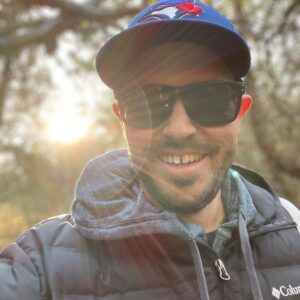David Byrne first came to St. Michael’s in 2006 to pursue a Master of Theological Studies degree and left four years later with a Master of Divinity degree, a new career path in restorative justice and some unanswered ethical questions surrounding the criminal justice field.

It was these unanswered questions that compelled him to complete his Doctorate in Theology, with a focus on Christian Ethics and a specialization in bioethics from the University of Toronto’s Joint Centre for Bioethics. He will be among those receiving his doctoral degree from St. Michael’s Faculty of Theology on November 9.
While pursuing his master’s degree he did a placement at Peterborough Community Chaplaincy (PCC), a faith-based agency that supported people coming out of prison to reintegrate in the community. He would eventually serve as the organization’s executive director from 2015-2018.
PCC is now a part of One City Peterborough, which offers a variety of programs aimed at those considered a high risk to reoffend, including offering transitional housing, palliative care for prisoners at the end of life, and Circles of Support and Accountability (CoSA), a Canadian program that assists people who have committed sexual offences to lead responsible, constructive, and accountable lives in their communities. Its ultimate goal is that no new victims are created.
As a placement student, he worked on the frontlines of the CoSA program and working with high-risk offenders. The image he held of what a high-risk offender might look like was challenged, as he got to know the people who used the program. He witnessed first-hand the effectiveness of reducing the risk to reoffend came from building personal relationships rather than ostracizing these people.
His academic advisor, Dr. Dennis Patrick O’Hara, recognized that upon his graduation from his master’s he still had pressing ethical questions stemming from his field and advocacy work. He returned to St. Michael’s in 2012 to a setting that would give him the structure and rigor to examine these questions. One of these ethical dilemmas, which formed his thesis topic, was the use of pharmaceuticals to halt the sex drive for people convicted of sexual offences.
His dissertation described how chemical castration is a part of the larger justice system that treats people convicted of sexual offences as predatory animals, incurably sick people, or demonically possessed rather than moral individuals capable of discerning right and wrong. He’s gone on to present his findings at conferences.
He’s received financial support through the Redemptorist Bursary for Lay Theologians and Regis St. Michael’s Financial Aid Committee. Also supporting him in his academic journey are Doctoral Supervisors Profs. Christopher Brittain and Dennis Patrick O’Hara; cherished committee members like Marilyn Legge, Tom Reynolds, Michael Bourgeois and Alison Thompson; faculty and staff at USMC/Regis, including Emil Iruthayathas and Catherine Mulroney; and doctoral colleagues Erin Green and Kate McCray. He would also like to thank his wife Nathalie and children, Rosalie and Edison, for their unwavering support and encouragement along the way.
Now he’s a full-time faculty member at the Community and Justice Services program at Centennial College while teaching in the Policing and Community Well Being program at Trent University Durham. He also remains committed to his advocacy work by sitting on various boards including Restorative Justice Housing Ontario (RJHO) and CoSA Canada, the parent organization for CoSAs nationally.

